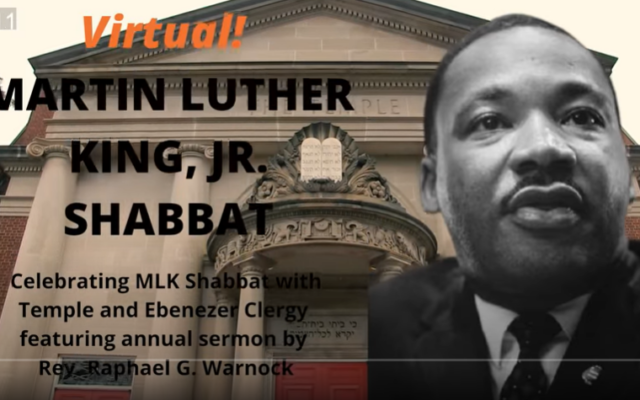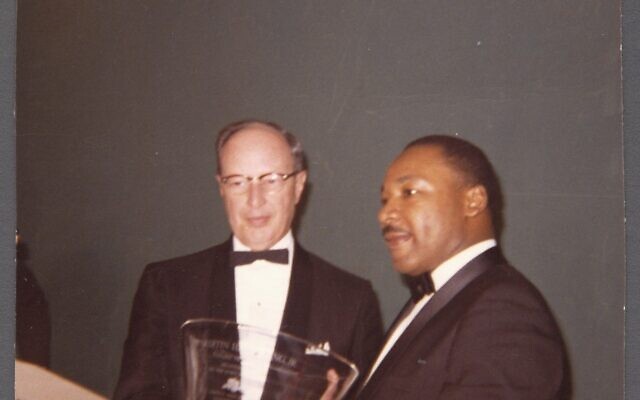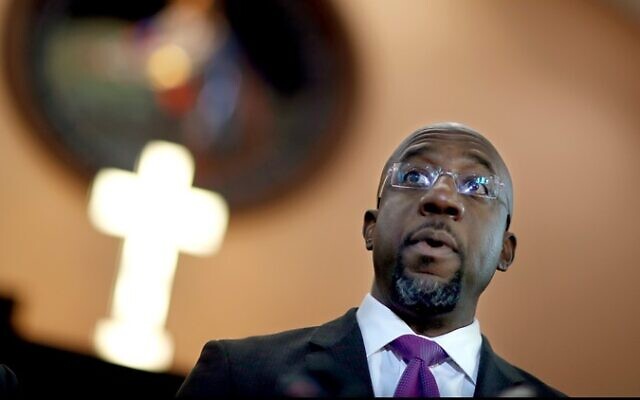Jews and Christians Honor the Legacy of MLK Together
In the annual service, leaders of The Temple and Ebenezer Baptist Church cited the continuing relevance of the slain civil rights leader.
Dave Schechter is a veteran journalist whose career includes writing and producing reports from Israel and elsewhere in the Middle East.

The degree to which the message preached by the Rev. Martin Luther King Jr. remains relevant was emphasized by the religious leaders of The Temple and Ebenezer Baptist Church during the annual Martin Luther King Shabbat Worship service on Jan. 14.
This was the 37th year that The Temple has commemorated the life of the slain civil rights leader, who was co-pastor of Ebenezer Baptist (with his father, Rev. Martin Luther King Sr.) from 1960 until his assassination on April 4, 1968, in Memphis.
It also was the 14th year that the service has been held in conjunction with Ebenezer Baptist — and the second consecutive year that the service became a virtual event, because of the continuing public health threat posed by the COVID-19 virus.
In his welcoming remarks, Rabbi Peter Berg, senior rabbi of The Temple, said: “It’s difficult to remember a time when we have missed Dr. King more than we do today, more than we do this year. As a people of faith, we must continually work to renew our commitment to repair the torn social fabric of our society.”
Barely a week after the hostage incident at a Texas synagogue, Berg said: “This has been a difficult year for the Jewish community, with anti-Semitic acts increasing exponentially, we live in a world that is filled with Jew-hatred. But our friends at Ebenezer have been there with us every step. Your pastor, my pastor, has called out anti-Semitism and you have called out anti-Semitism. And it is a reminder to us that we are in this together, that we have but one God.”
Speaking from the pulpit at Ebenezer Baptist, where he has been senior pastor since 2005, Rev. Raphael Warnock called Berg “My brother, my rabbi.”

“Isn’t it wonderful that The Temple and the Ebenezer Baptist Church continue in our deep relationship, our bonds of friendship and kinship, our commitment to work as co-conspirators in the project of getting in good trouble,” Warnock said.
“Get in good trouble” was a favorite phrase of the late U.S. Rep. John Lewis, who for many years was a member of Ebenezer Baptist. The Temple’s relationship with the church dates to the 1950s and the friendship between Rabbi Jacob Rothschild and King, and the former’s support for the latter’s civil rights efforts.
Drawing his sermon from 2 Kings in the Hebrew Bible, Warnock spoke of the prophet Elisha and placed Rev. Martin Luther King Jr. in the tradition of prophets “who comfort the afflicted and afflict the comfortable.”
Turning to temporal affairs, Rev. — and U.S. Sen. — Warnock said, “We witnessed not long ago something we thought perhaps we would never witness in our country, when our capitol was invaded, not by outsiders, but by insiders. There was a violent insurrection on the Capitol. The nation became weak.”
Warnock contrasted Jan. 5, 2021, when he and fellow Democratic Sen. Jon Ossoff won runoffs to become Georgia’s first African American and Jewish senators, respectively, with the next day’s violent attack on the Capitol by a mob that sought to prevent Congress from counting the Electoral College votes that certified Joe Biden as the 46th president of the United States.

“Here’s where we are as a nation: We are somewhere between the fears and the bigotry and the division of January 6 and the hope and possibility of January 5,” Warnock said, then asking “Which direction will we go?”
Warnock said that he frequently is asked what King would say today, what King would do today. He decried what he sees as the misuse of King’s legacy. “You cannot remember Dr. King and dismember his legacy at the same time. If you would lift up his name, you must lift up the issues that he cared about and died for,” he said. “I’m sick and tired of politicians lining up, offering platitudes to his name while supporting voter suppression, voter subversion, mean-spirited policies against the poor and vulnerable, frustrating efforts to provide health care to working people.”
At the close of the service, Berg’s predecessor as senior rabbi, Rabbi Emeritu Alvin Sugarman, echoed the opening words of his successor. “Never in my lifetime can I remember a greater need for the message, for the courage, for the deeds of Dr. King, not only to inspire us but to serve as a beacon to save this American democracy of ours. May the life that Dr. King lived and may the life that we go forward from this moment not only continue his legacy and deeds but make real that legacy, make real his deeds, make real our lives in helping the American promise become the American reality,” Sugarman said.
- Dave Schechter
- News
- Local
- The Temple
- Ebenezer Baptist Church
- Martin Luther King Shabbat Worship
- Rev. Martin Luther King Sr
- COVID-19 virus
- virtual event
- Rabbi Peter Berg
- Texas synagogue
- Congregation Beth Israel
- Colleyville Texas
- anti-Semitic
- Reverend Martin Luther King Jr.
- Reverend Raphael Warnock
- Representative John Lewis
- Rabbi Jacob Rothschild
- Civil Rights
- Capitol insurrection
- January 6
- Capitol
- Senator Jon Ossoff
- Electoral College
- Congress
- President Joe Biden
- Voter Suppression
- Rabbi Emeritu Alvin Sugarman



comments